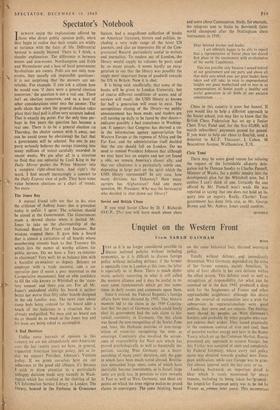Spectator's Notebook
T ALWAYS enjoy the explanations offered by Ithose who direct public opinion polls, when they begin to realise that their results are wildly at variance with the facts of life. Differential turnout is usually blamed. There is, I think, a simpler explanation. The difference is between events and non-events. Northampton and Erith and Westminster and a host of local government by-elections are events. Polls are not only non- events, they usually ask impossible questions: it is not surprising that the answers are un- reliable. For example, if you ask a citizen how he would vote `if there were a general election tomorrow,' the question is not a real one. There isn't an election tomorrow, and so a host of other considerations enter into the answer. The polls claim that when the general election takes place their final poll is often very accurate indeed. That is exactly my point. For the only time per- haps in five years the question has become a real one. There is to be a general election on Thursday, the elector cannot wish it away, nor can he avoid (even by abstaining) the fact that a government will be selected. No one in any party seriously believes the swings (running into many millions of votes) carefully recorded in recent weeks. We are after all in a situation so fluid that one editorial by Cecil King in the Daily Mirror panics the Prime Minister into a complete right-about-turn. And right's the word. I find myself increasingly a convert to the Daily Express view of polls. They have some value between elections as a chart of trends. No more.






































 Previous page
Previous page